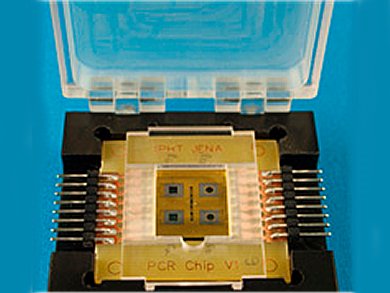The proceeding global trade of livestock increases the risk of spreading animal diseases and other pathogens. Hence diagnostic methods and tools are required to enable a fast onsite analysis.
Researchers around Barbara Seise, University of Jena, and Robert Möller, Institute of Photonic Technology e.V. (IPHT), Jena, Germany, developed a portable and robust system which is suitable for the automated analysis of DNA or RNA of selected pathogens such as foot-and-mouth disease virus (FMDV).
The system incorporates a stationary PCR chip and is coupled with a DNA chip and an electrical detection for the sequence-specific identification of the PCR products. The PCR chip represents a miniaturized form of the classical thermocyclers and enables a fast and sensitive amplification as well as labeling of specific DNA sequences with minimal space and energy requirements. The detection and identification of the PCR products is performed on a DNA chip with an electrical detection scheme.
The combination of the two technologies allows a very fast and highly specific sequence-based detection and differentiation of pathogens. It combines the accuracy of sequence analysis with the speed of chip technologies. Less than 2 h are required for the total analysis including DNA amplification and DNA detection.
- Chip-based detection system for the on-site analysis of animal diseases,
Barbara Seise, Anja Brinker, Robert Kretschmer, Martha Schwarz, Bettina Rudolph, Toni Kaulfuß, Matthias Urban, Thomas Henkel, Jürgen Popp, Robert Möller,
Eng. Life Sci. 2011.
DOI: 10.1002/elsc.201000046




